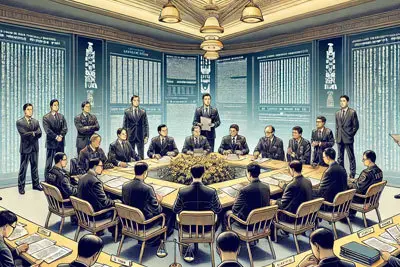
Strict Penalties for Side Betting and Unauthorized Currency Exchange
One of the law’s main provisions targets “betting under the table,” also known as side betting, a practice prevalent in Macau’s casino industry. This provision introduces penalties of up to eight years imprisonment for those found participating in or facilitating these activities. Additionally, the law extends to individuals who engage in any form of illegal gambling, with penalties of up to six months in prison for merely placing a wager in an unlicensed game.
The legislation also cracks down on illegal currency exchange operations within Macau’s integrated resorts, which include casinos and their surrounding areas. Often associated with “money exchange gangs,” these unauthorized exchanges have posed challenges for Macau’s regulatory environment. Individuals caught conducting unlicensed foreign exchange transactions for gambling purposes can now face up to five years in prison, a measure intended to disrupt the money exchange networks that have often exploited Macau’s gaming sector.
Enhanced Investigative Authority for Law Enforcement
Under the new law, Macau’s Judiciary Police will have expanded investigative tools to enforce gambling regulations more effectively. Law enforcement officers are now authorized to conduct undercover operations and perform night-time searches when investigating illegal gambling activities. These undercover operations allow agents to act without fear of prosecution for actions taken within the scope of their investigations, provided they do not incite criminal acts. However, informants’ identities will remain protected unless a court determines that their testimony was intentionally misleading, thereby safeguarding the integrity of the evidence gathered.
Furthermore, the law lifts the previous restriction on night-time domicile searches for suspected offenses related to illegal gambling, allowing authorities to conduct such searches between 9 p.m. and 7 a.m. for cases involving illicit betting and mutual betting. This amendment acknowledges the nocturnal nature of gambling crimes in Macau, enabling a more responsive approach to enforcement during peak times for such activities.
Addressing Emerging Forms of Illegal Gambling
Macau’s new legal framework not only strengthens penalties for traditional forms of illicit gambling but also criminalizes online gambling, illegal mutual betting, and unlicensed lotteries. The inclusion of a provision against “illegal online gambling” reflects the government’s determination to keep all gambling activities strictly regulated and confined to licensed establishments. The law categorizes online gambling as any game of chance or mutual betting conducted remotely or electronically, thus ensuring that the prohibition encompasses all digital platforms, regardless of physical location.
Additionally, the law defines penalties for the unauthorized operation of mutual betting pools and lotteries, imposing fines or prison terms of up to three years for those found operating illegal lotteries. This includes the illegal sale of lottery tickets like Hong Kong’s Mark Six lottery, which has historically been popular in Macau.
Corporate Liability and Implications for Casino Operators
Significantly, the legislation expands accountability beyond individuals to corporations and other legal entities engaged in illegal gambling activities. Companies that are facilitating unlicensed gambling can now face fines of up to MOP 18 million (approximately $2.25 million) and, in some cases, judicial dissolution. The law also permits authorities to hold company representatives, such as directors and managers, personally responsible for fines imposed on their businesses if they are proven to have participated in the offense.
As Macau seeks to uphold a tightly regulated gaming industry, implementing the Illegal Gaming Law represents a milestone in the region’s efforts to combat unauthorized gambling. The measures are part of a broader crackdown following high-profile cases involving junket operators such as Alvin Chau and Levo Chan, who were implicated in illicit betting activities. By expanding enforcement powers and tightening penalties, Macau’s government aims to curb illegal gambling operations and protect the integrity of its casino sector.
Sources:
Macau’s Illegal Gaming Law Comes Into Effect on Tuesday after Being Officially Announced, asgam.com, October 29, 2024.




